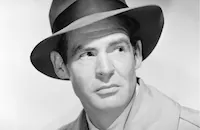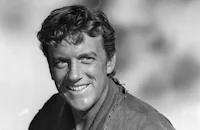Her Twelve Men

Brief Synopsis
Cast & Crew
Robert Z. Leonard
Greer Garson
Robert Ryan
Barry Sullivan
Richard Haydn
Barbara Lawrence
Film Details
Technical Specs

Synopsis
Jan Stewart arrives at The Oaks, a private boarding school for boys, to begin a new chapter in her life as the institution's first female teacher. The headmaster, Dr. Avord Barrett, who hired Jan on the recommendation of a prominent family despite her lack of teaching experience, gives her background information on the twelve boys who will be under her care. That night, after Jan puts her charges--who insist on calling her "sir"--to bed, she is puzzled when young Bobby Lennox comes down complaining of a stomachache but refuses her offer of medicine. Joe Hargrave, who is in charge of the lower school, explains that most boys are homesick at the beginning of the school year, adding that many boys, like Bobby, have parents who simply do not want to be bothered with them. Jan confesses her lack of teaching experience to Joe and reveals that she was separated from her husband, who died several months earlier. Classes begin the following morning, and Jan struggles to assert her authority over the mischievous boys and receives copious advice from her fellow faculty members. One night, Jan finds the boys hiding a puppy that came from Joe's dog's litter. Jan agrees to speak with Joe about letting the boys keep the puppy, but when she goes to his quarters, she sees Joe returning from a date with the rich, beautiful Barbara Dunning. Joe tells Jan that dogs are not allowed in the dormitory, and when he cautions her not to try to win her students' approval by spoiling them, they quarrel. The following day, however, Jan finds Joe helping the boys build a pen for the puppy in the stable. One night, Bobby gets a call from his parents, who are vacationing in the French Riviera, telling him he will once again be spending Christmas at the school. Appalled at his parents' insensitivity, Jan comforts the crestfallen boy. One day, wealthy Richard Y. Oliver, Sr., a widower, enrolls his troubled young son, Richard, Jr., in the school. Richard, Jr. alienates the other boys with his belligerent manner, and one night sets off the fire alarm by tampering with the sprinkler system. No one will identify the guilty party, and when Dr. Barrett punishes the entire class, Richard, Jr. is ostracized and tormented by the other boys. As time passes with still no mail from Bobby's parents, Jan types a letter to Bobby and signs his mother's name to it. One night, the boys trick Richard, Jr. into going out on the ledge outside their dorm room, and he falls and breaks his leg. Furious, Dr. Barrett informs Jan that Richard, Jr.'s father is withdrawing him from the school, and orders her to accompany the boy to his home in Houston. Jan tries to get through to the angry boy, and as she prepares to return to school, Richard, Jr. tearfully begs her not to leave. Witnessing the scene, Richard, Sr. cancels his business trip to spend more time with his son. Jan agrees to stay in Texas with the Olivers for a while, and Joe looks after her boys. Jan and the Olivers return to The Oaks, and Richard, Jr. learns to get along with the other boys. Joe is jealous over Richard, Sr.'s obvious affection for Jan, and after they quarrel, Jan says she will resign her post. That evening, Richard, Sr. calls and proposes to Jan. As commencement approaches, Dr. Barrett receives word that Bobby's parents will not be back in the country in time to attend the ceremony. Jan visits Bobby, who is in the infirmary, and reads the boy a letter supposedly written by his mother. Joe hears her and notices that Jan is improvising the loving message from Bobby's mother while holding her letter of recommendation from Dr. Barrett. After Jan leaves the infirmary, Joe kisses her and says she turned out to be a good teacher, then demands to know how she could leave the school--and him. As Jan prepares to depart with the Olivers, her boys give her a going-away present and implore her not to leave. Jan impulsively tells them she is staying at The Oaks, then runs after Joe and embraces him.

Director

Robert Z. Leonard
Cast

Greer Garson

Robert Ryan

Barry Sullivan

Richard Haydn

Barbara Lawrence

James Arness
Rex Thompson

Tim Considine
David Stollery
Frances Bergen

Ian Wolfe
Donald Macdonald
Dale Hartleben
Ivan Triesault
Stuffy Singer
Peter Votrian

Lee Aaker
Peter Homan
Timothy Marxer
Patrick Miller
Aurelio Celli
Peter Dane
Robert Clarke
Larry Olsen
Gary Stewart
Kate Lawson
Sarah Spencer
Vernon Rich

Sandy Descher
Peter Adams
John Dodsworth
Phyllis Stanley
Jean Dante
Norman Gilestad
Ed Dearing

Robert Carson
Jo Gilbert
Mary Adams
Chris Warfield
Stephen Dane
Owen Pritchard
Jay Gilpin
Ron Rondell
A. Cameron Grant
Crew
Al Alt
Peter Ballbusch
George Boemler
Daniel B. Cathcart
Alvord Eiseman
Dave Friedman
Cedric Gibbons
A. Arnold Gillespie
Keogh Gleason
Sydney Guilaroff
Roger Hill Jr.
Laura Z. Hobson
John Houseman
Irene Ives
Al Jennings
Bronislau Kaper
Jud Kinberg
Jim Lippert
Walter Marsh
Warren Newcombe
William Roberts
Helen Rose
Joseph Ruttenberg
Douglas Shearer
William Tuttle
Charles Wallace
Edwin B. Willis

Film Details
Technical Specs

Articles
Her Twelve Men
Greer Garson had been one of MGM's top stars of the 1940s, but by the early 1950s, her luster had dimmed, and Her Twelve Men, Garson's last film under her MGM contract, is a prime example of why. It's not a bad film; it's a lively story with good performances, and the superb production values that MGM was known for, including handsome color cinematography which shows off Garson's red-haired beauty, still vibrant at nearly 50. The problem was that for more than a decade, Garson had been playing what James Robert Parish and Ronald L. Bowers described in The MGM Stock Company (1973) as "the 1940s personification of the genteel, unneurotic woman who de-emphasized her sexuality in order to be the self-sacrificing, noble heroine of good causes in such films as Mrs. Miniver (1942)." Garson's role in Her Twelve Men was more of the same, and postwar audiences wanted something a little edgier. In fact, so did Garson. The previous year, Garson had desperately wanted to play the adulterous army wife in Columbia's film version of From Here to Eternity (1953), but neither Columbia executives nor Garson's MGM bosses believed that the public would accept her in such a role. So the part went to a newer model of the same type, Deborah Kerr, and gave Kerr's career a whole new direction.
Garson had also asked MGM to cast her as Caesar's wife Calpurnia in their prestige production of Julius Caesar (1953), even though it was little more than a cameo. The character may have been another noble wife, but at least it was Shakespeare, and a stretch. Satisfied, Garson requested Julius Caesar producer John Houseman for Her Twelve Men. Houseman was unenthusiastic about the film, calling the character "a female Chips," referring to Goodbye Mr. Chips (1939), the film that started Garson's MGM career. To cut through the sentimentality, he hired Laura Z. Hobson to write the screenplay. Hobson, a novelist and former journalist, was best known for her novel about anti-Semitism Gentleman's Agreement (1943), which was made into an Oscar®-winning film in 1947. Her Twelve Men would be Hobson's only screenplay. But as Houseman wrote in his memoirs, "What astringency she might have given it was offset by the studio's selection of Robert Z. Leonard to direct it." The best Houseman could say for Leonard's effort was that "it was not a disaster." Houseman's next production at MGM was more to his liking: Executive Suite (1954).
Her Twelve Men did provide a change of pace for Garson's leading man. The part of teacher Joe Hargrave was one of Robert Ryan's rare good guy roles, after more than a decade of playing bigots, bullies, and murderous psychopaths. Off screen, Ryan was the polar opposite of the nasty characters he'd been playing. He was active in liberal politics, and a devoted family man married to a Quaker. Ryan and his wife had even founded a progressive private school in the San Fernando Valley that their children attended. Houseman had known Ryan since the late 1930s, when both worked with the Max Reinhardt Theatrical Workshop. The same year they made Her Twelve Men together, Ryan starred in Houseman's off-Broadway production of Shakespeare's Coriolanus (1954) at New York City's Phoenix Theater.
Like audiences, critics had grown tired of Garson's nobility. The vitriol in some reviews was excessive, and seemed unfairly aimed at Garson's image rather than at the quality of the film itself. Bosley Crowther wrote in the New York Times, "The particular brand of golden sunshine that Greer Garson is called upon to shed in Her Twelve Men, a little M-G-M confection...is so obviously manufactured and falls on such artificial ground that it scorches rather than nurtures any blossoms in this choking hothouse dust....The extent of her evident contribution to the health and education of her kids is the doing of a few little favors and the casting about of her smile."
Garson survived these less than gallant attacks. She left MGM, did some stage work, television, and an occasional film, earning excellent reviews playing Eleanor Roosevelt in the film version of the play Sunrise at Campobello (1960). She returned one last time to MGM in 1966, as the mother superior in The Singing Nun. She retired for good in the early 1980s, and died in 1996, at the age of 92.
Director: Robert Z. Leonard
Producer: John Houseman
Screenplay: William Roberts and Laura Z. Hobson, from the story "Miss Baker's Dozen," by Louise Baker
Cinematography: Joseph Ruttenberg
Editor: George Boemler
Costume Design: Helen Rose
Art Direction: Daniel B. Cathcart, Cedric Gibbons
Music: Bronislau Kaper
Cast: Greer Garson (Jan Stewart), Robert Ryan (Joe Hargrave), Barry Sullivan (Richard Y. Oliver, Sr.), Richard Haydn (Dr. Avord Barrett), Barbara Lawrence (Barbara Dunning), James Arness (Ralph Munsey).
C-91m. Closed captioning.
by Margarita Landazuri

Her Twelve Men
Quotes
Trivia
Notes
The working titles of this film were Miss Baker's Dozen and Snips and Snails. "Her Twelve Men" was also the title of an excerpt of Louise Baker's novel Snips and Snails that appeared in Ladies Home Journal in December 1953. The film opens with a montage sequence, narrated by Greer Garson as "Jan Stewart," depicting Jan's childhood fantasies about a glamorous future. The character continues to provide voice-over narration throughout the first part of the film. June 1952 Hollywood Reporter news items report that Sidney Franklin was originally assigned to produce the film. In his memoir, John Houseman recalled that Garson requested him as producer, and he reluctantly agreed. "I spent little time on Miss Baker," Houseman wrote. "My only positive contribution was the addition to the cast of my friend Robert Ryan, who was trying to shed the stigma of playing only brutal and violent parts." Houseman added that he seldom visited the set during production: "After a few tedious arguments with [Robert Z.] Pop Leonard, I stopped checking on the directorial methods of this ancient, experienced man who had directed Miss Garson in Pride and Prejudice more than a dozen years before."
Timothy Marker, who appeared in the film as "Tommy," was the grandson of silent film star Francis X. Bushman. Her Twelve Men was the last film Garson made under her contract with M-G-M. Garson was signed by the studio when she made her motion picture debut in the 1939 film Goodbye, Mr. Chips (see AFI Catalog of Feature Films, 1931-40). She returned to the studio, along with a number of other former M-G-M contract stars, for the 1965 film The Singing Nun.

Miscellaneous Notes
Released in United States Summer July 1954
Released in United States Summer July 1954














